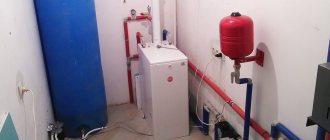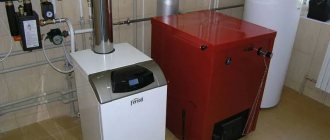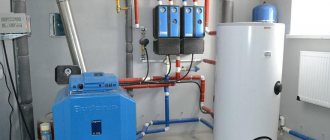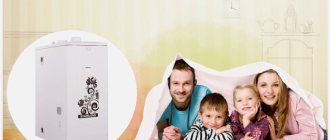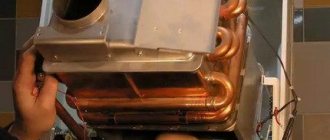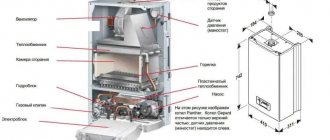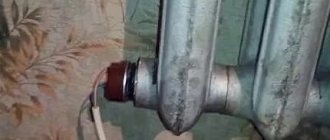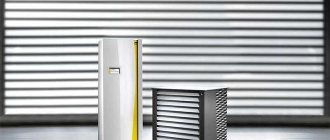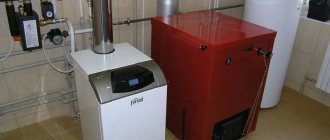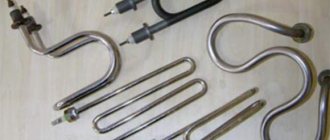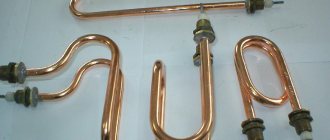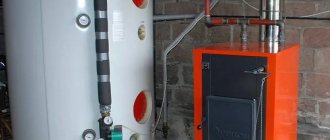Home / Liquid fuel boilers
Back
Published: 06/15/2019
Reading time: 7 min
0
1770
A diesel boiler (DBC) for heating household and one-story residential buildings is not very common, due to the need to use expensive fuel.
However, in non-gasified residential areas, remote from main gas pipelines and with a shortage of coal and electricity, this type of heating is popular due to its ease of installation and operation.
For owners of private houses who have decided to purchase diesel boilers, it is necessary to first perform a simple technical and economic comparative calculation of options with different models in order to select the optimal heating equipment.
DCs are available in two types of heating: condensing and traditional. The former are considered more economical because they use waste heat from condensate, so the operating efficiency of such a system is much higher, even with the increased cost of the power unit itself.
- 1 Diesel boiler design
- 2 Benefits of a diesel boiler for your home 2.1 How much fuel does it consume per month?
- 3.1 Single-circuit or double-circuit
Diesel boiler design
A diesel boiler for heating a private house has a simple design. The combustion chamber contains a nozzle burner. The firebox is made in the form of packaged pipe heating surfaces, inside of which a water coolant circulates, and outside they are washed by hot flue gases.
Heat transfer to water occurs in the form of convective and radiative heat exchange. The latter is formed from a torch of burning diesel fuel emerging from the nozzle of the burner device.
The heated water, thanks to natural or forced circulation, enters the intra-house system, transferring heat to the internal air in the room, and then returns to the unit, repeating the heating cycle. Flue gases, having transferred heat to the water, are released into the chimney and the environment.
Main elements of an oil-fuel boiler:
- Burner for heating oil.
- Nozzle.
- Turbocharging
- Cleaning filters for diesel fuel.
- Feed pump in forced circulation circuits.
- Remote Control.
- Automatic safety with thermostat, combustion sensors.
- Fan for air supply.
The main difference between a DC and a gas heater is the special design of the burner with a fan to ensure a fine spray of diesel fuel. Sometimes it is equipped with an inflatable burner with air injection to complete the combustion process.
The only side effect of such structures is noise during operation, so the diesel boiler is placed in a separate unit with good sound insulation.
When choosing a burner device, take into account the suction depth. When the fuel tank is installed at o, then a burner with a high given indicator will be required; if it is higher than the boiler level, then it can be neglected.
Diesel heating boilers for private homes completely burn liquid fuel without loss with low flue gas temperatures, so they do not require an expensive ceramic chimney. There are also no special requirements for the height of the chimney, since the draft is supported by supercharging.
In connection with this, when installing a diesel boiler room, it will be enough to install an inexpensive coaxial chimney with a built-in ventilation duct, which will further improve the characteristics of air flow into the combustion chamber. It comes out through the wall of the building.
Insulation of smoke ducts is also not required, since the installation has a recuperator that prevents overheating of the pipes and the formation of condensation inside the chimney. A wall-mounted diesel boiler must have a chimney diameter equal to the outlet pipe from the firebox.
There are fire safety restrictions for installing a fuel tank in a boiler room building - no more than 0.8 m3. Typically, diesel fuel boilers are equipped with polymer containers that are resistant to aggressive environments. According to the connection diagram, they are installed outdoors.
In this case, the physical properties of diesel fuel and its ability to increase viscosity at outside air temperatures below +5 C are taken into account, after which its speed through the fuel lines drops, which creates combustion instability or a complete stop in the supply of diesel fuel to the burner device. Therefore, when placed externally, the diesel pipeline system requires insulation or independent heating.
Advantages and disadvantages
Diesel units have the following features:
- Autonomy. They operate without physical control or human presence.
- Lack of inertia. This eliminates the problem of coolant boiling.
- Versatility. Can operate on machine oils.
On the negative side:
- Obtaining the highest efficiency only at maximum power.
- Danger of fuel to human life and the environment.
- High cost of diesel fuel.
- The need for power supply.
Benefits of a diesel boiler for your home
Diesel boilers for heating and hot water systems in private housing construction have a number of advantages that fully compensate for expensive diesel fuel. The most important advantages are an efficiency of 85% and the ability to automate the combustion process. The user can independently install a recreation center at home without obtaining permits from the gas inspectorate and mandatory training and passing operating exams.
The main advantages of a diesel boiler for the home:
- fast execution of installation and construction work;
- affordable fuel supply even for remote areas;
- installation of smoke exhaust through the building wall;
- automatic combustion mode in accordance with the outside temperature;
- high level of protection, complete shutdown of the diesel heating boiler in the absence of water and torch breakage; acceptable prices.
However, this system also has disadvantages that can be technically eliminated, for example, noise during operation and the smell of diesel fuel, which is eliminated when diesel boiler systems are placed in separate buildings. The next disadvantage of DC is its energy dependence, therefore, in regions with a low level of power grid reliability, the installation of a backup power source is required.
How much fuel does it consume per month?
Fuel consumption for a diesel boiler for heating needs (Рт) is related to the boiler power and is indicated in the passport. It can be obtained by dividing the DC power in kW by 10, the result is obtained in kg, the calculation is applicable for heating cold equipment during start-up.
In stable operating mode, this figure corresponds to 30-50% and depends on the level of thermal insulation of the building. The required power (Mk) is proportional to the area in the ratio: 10 kW per 100 m2.
To determine the fuel consumption of a diesel boiler for a month or season, simple calculations are performed:
RT = Mk X 0.1. For a house area of 100 m2, the minimum power should be: 0.1X100= 10 kW. Next, the hourly rate is calculated: 0.1X10 = 1 kg of diesel fuel. Daily consumption: 1X24=24 kg.
It corresponds to the minimum outdoor temperature in winter, which depends on the installation area and is specified in SNiP 23-01-99 “Building climatology”.
If the heating season is 200 days a year, for preliminary calculations we can assume that half of this period the household will operate at full load, and 100 days at half load, then diesel fuel consumption for the entire season: (100X24) + (100X12) = 3600 kg. Consumption for the winter month with minimum outside temperature: 100X24=240 kg. Consumption for the spring month: 100X12=120 kg.
These are average costs; they do not indicate a number of parameters: the degree of insulation, the estimated temperature inside the room, the load on the hot water supply, the design of the heating unit.
User reviews
Andrey, Moscow, 35 years old:
“I purchased a boiler 3 years ago for my dacha. The unit is small and compact, with a steel heat exchanger and an automatic unit for convenient operation settings. There were no complaints during this time. I maintain it regularly, changing filters and cleaning internal elements from soot.”
Victor, Saratov, 56 years old:
“After viewing dozens of reviews, I chose a small 17-kilowatt boiler for my dacha. I liked the quiet operation and quick heating of the room. But in severe frosts, the coaxial chimney begins to vibrate and make a lot of noise.”
Irina, 30 years old, Kirov:
“We have Kiturami at our dacha. Glad you installed it. Now you can stay outside the city even in the cold season. Fuel costs are low, and maintenance doesn’t cause any problems for my husband.”
How to choose a diesel boiler
The domestic market has a wide range of heating oil boilers. The choice of model depends on the heating load, pipe material, burner type and type of load: heating, hot water supply and ventilation.
Installation performance characteristics:
- boiler with or without external boiler;
- type of heat exchange system: cast iron or steel;
- type of condensation;
- automatic control with thermostat.
In order to build an efficient heating system, the building must comply with the building characteristics of the house; therefore, the following are taken into account:
- Diesel boiler piping diagram and the need for separate circuits.
- Installation performance.
- Factory brand.
- The price of the project as a whole.
An equally important indicator of the durability of the pipe is the material of the pipe walls operating in an aggressive environment in high temperature zones. Soot, which appears from fuel combustion, forms an acid in a humid environment, leading to corrosion of pipe walls.
Cast iron increases corrosion resistance, but with sudden temperature changes, it can crack, in addition, it is sold at a higher price.
Steel heating surfaces are lighter and cheaper, resistant to temperature changes, but are susceptible to corrosion, so stainless steel is the best option for system longevity.
Single-circuit or double-circuit
Diesel boilers for heating a private house are manufactured as single and double-circuit. Each scheme has its pros and cons:
- Single-circuit ones are intended only for heating needs. If domestic hot water is required, a diesel installation will need to be connected to an external boiler. The main advantage of such systems is the ability to heat large houses.
- Double-circuit - have pre-installed independent DHW and heating circuits. Depending on the brand, a bithermic heat exchanger is installed in the design.
Many recreation centers are equipped with hot water storage tanks. The advantage of this scheme is the constant provision of DHW service to the consumer. When connecting a diesel boiler in a double-circuit version, it is necessary to increase the calculated fuel consumption by 20% to cover the additional load on the domestic hot water supply.
A preliminary assessment is made of the feasibility of using a dual-circuit circuit; it may be cheaper to place a free-standing water heater without loading the heating system.
Calculation of diesel boiler power
The design heating capacity affects the consumption of diesel fuel and the efficiency of the boiler unit. The unit of power is kW. The indicator is indicated in the device documentation. The calculation is made based on the data of the heated area; for this purpose, the entire total area of the rooms is summed up and the resulting result is divided by 10. This formula is applicable for moderate climates and rooms with a height of up to 3 m.
Thermal performance, for example, for Kiturami boilers is calculated using data on the heated area of the facility with a ratio of 1 kW per 10 m2. Next, the operation of the equipment at maximum loads is taken into account; for this, 15-20% of the power reserve is added.
Kiturami boiler diagram
For models of dual-circuit DCs, a coefficient of 1.2 is introduced. A similar calculation is performed for other brands of recreational facilities, and their operation must ensure a sanitary temperature of the internal air in the room and heating of hot water to 65 C.
Features of operation
The first version of the furnace has a number of disadvantages that should definitely be taken into account:
- part of the exhaust enters the room;
- when using waste oil mixed with water as fuel, the furnace begins to “shoot” fire drops through the holes in the pipe;
- The efficiency of the device is extremely low.
Taking into account the above, such a heater can only be used in non-residential premises, while removing flammable materials to a safe distance. There should be a carbon dioxide fire extinguisher nearby.
A dripper stove consumes fuel 3–4 times more efficiently and all exhaust is completely removed into the chimney. But for it to function, there must be a power supply available.
The best diesel boilers
The Russian heating equipment market offers diesel boilers from the following well-known global manufacturers:
- German, Viessmann, Vaillant, Buderus;
- French De Dietrich;
- Slovakian Proterm;
- Italian Ferroli;
- Czech Dakon;
- Spanish Roca.
According to consumer reviews, all of these DC brands are reliable and economical, and have a long service life. The choice of Europeans is De Dietrich, French boiler units that provide serious competition to German devices.
The Russian buyer prefers budget DK brands made by:
- Korean boiler manufacturers, diesel boilers Kiturami and Navien.
- Italian factories, Fondital Capri and Nova Florida.
- Diesel boilers ACV, Belgian production.
- Boiler brands that have recently entered the market are Finnish DanVex and American EnergyLogic EL.
Prices for recreation centers depend on the brand of the manufacturing plant, design capacity and level of automation. German ones are sold at prices of 110-150 thousand rubles. with basic equipment. The Kiturami line of diesel boilers from Korean manufacturers is sold in the range of 55-90 thousand rubles.
Additional equipment must be purchased separately. The modern market offers a wide selection of domestic liquid fuel boilers with an initial price range of 28,000 - 30,000 rubles. This price corresponds to a 16 kW unit with 90% efficiency.
It is important to note that the automation kit, for example, Navien diesel boilers, includes a remote control, overheating protection, auto-diagnosis and emergency stop.
Popular models and manufacturers
Boilers from foreign and domestic companies are on sale. Popular manufacturing plants produce dozens of models for different operating conditions.
Kiturami Turbo 13R
The heat generator is manufactured by a South Korean company and has a floor-standing configuration. Heat-resistant steel is used to make the housing, and the heat flow is pumped using a special pump.
Kiturami Turbo 13R – floor-standing boiler.
To adjust operating modes, a control panel is used, which allows you to set the heating temperature and other parameters. The efficiency of the Kiturami Turbo 13R reaches 91.5%, and the consumption is 1.97 kg/h (2.25 l/h).
Navien LST-17KG
The efficiency of Navien LST-17KG is 90%, and fuel consumption is 1.93 kg/h (2.2 l/h). The unit has a remote control system using a room thermostat, as well as the option of programming operating settings to reduce fuel mixture consumption. The homeowner can specify a temperature reduction of up to +15°C at the time of leaving the house.
De Dietrich EFU 22 (B-Control)
The diesel boiler is manufactured by a French company and has a power of 22 kW. Its efficiency reaches 97.3%. The model operates almost silently, because equipped with a heat exchanger with 3-way gas removal and sound insulation technology. Functional elements include automatic fuel ignition and a connector for connecting a thermostat.
De Dietrich EFU 22 (B-Control) has a power of 22 kW.
Ferroli ATLAS 32
The Italian unit is equipped with a replaceable burner and has a power of 32 kW. Its efficiency reaches 94.3%, and the service life of the cast iron heat exchanger exceeds 25 years. The boiler has an open combustion chamber, but operates almost silently.
Lamborghini AX 3 32
A universal 1-circuit model with a power of 32 kW, which largely repeats the previous series. The boiler uses a cast iron heat exchanger with 3-level gas exhaust. The operating efficiency is 91.6%. The body has an internal thermal insulation layer.
Lamborghini AX 3 32 – 1-circuit model.
Danvex B30
The heat generator is manufactured by a Finnish company and has a floor-mounted structure. Both diesel fuel and engine oil are used for operation. It is recommended to install the system in rooms up to 350 square meters. m.
The combustion chamber is equipped with smoke pipes, and processed products accumulate in the ash pan in the form of soot. The efficiency of Danvex B30 is 88%. If we consider a diesel heating boiler, fuel consumption reaches 3.3 l/h.
Ferroli ATLAS 47
The boiler is equipped with a cast iron heat exchanger and can operate as an autonomous source of hot water supply. It has a thermostat to protect against overheating and automatic temperature control. Combustion power reaches 45 kW, and efficiency is 94.1%.
Ferroli ATLAS 47 is equipped with a cast iron heat exchanger.
Bison 50 NL
The unit from a Slovak company with a floor-mounted design operates on liquid fuel and gas. The cast iron body provides 25 years of operation. The efficiency is 89%.
A 50 kW diesel boiler is used in houses with an area of up to 360 square meters. m.
ACV Delta Pro S 25 26 kW
A Belgian-made floor-standing boiler is intended for installing a heating system in large cottages and industrial facilities. Its body is made of stainless steel, and can use both diesel fuel and liquefied and natural gas as fuel. The 2-circuit model weighs 145 kg and has an efficiency of 91.9% and a service life of more than 15 years.
ACV Delta Pro S 25 26 kW – floor-standing boiler.
Rules for installing a diesel boiler
Installing a diesel boiler is a complex technological process that can only be performed by trained personnel. Installation and construction work is carried out in full compliance with fire, sanitary and environmental safety regulations. The entire complex of adjustment activities of modern DCs is carried out using software.
To install Kiturami diesel boilers, you need to equip a boiler room, install a combustion tank, vent the chimney into the environment and tie up the pipe system. Due to the noise and odors of solarium, it is recommended to carry out the building in a separate room with sound insulation.
House wiring diagram
The area must be sufficient to install a fuel tank; if this is not possible, then a tank with thermal insulation is installed next to the access road. If the fuel supply system turns out to be long, you will need burners with high suction power and insulation of the pipelines from the tank to the boiler.
Requirements for installing DC:
- The premises are non-residential with the required area, equipped with lighting and exhaust ventilation.
- Placement of floor-standing diesel boilers directly in residential buildings is carried out only on a non-combustible basis. The walls are also finished using non-combustible materials, for example, ceramic tiles.
- Automation of safety, to protect the recreation center, when the operating parameters of the coolant in terms of pressure, temperature and gas contamination of the boiler room are exceeded.
- Mandatory installation of a ventilation system with a capacity of at least three air exchanges per hour.
- Additional installation of backup power supply.
Some technical characteristics
It is not so difficult to guess that the cost of equipment increases with the improvement of operational and technical characteristics
In particular, you need to take into account power. Usually 1 kW is enough to heat a room measuring 10 square meters
Therefore, if you have a house of 100 square meters, then you need to buy a 10 kW boiler; such equipment will consume about 1 kilogram of diesel per hour.
As for weight, this parameter in most cases is not so important. Almost all models are placed on the floor. True, it is worth looking at the dimensions, since sometimes there is no room to install a wide or, conversely, tall boiler. If we talk about the power/weight ratio, then it is difficult to find any pattern. Much depends on the manufacturer and the materials used during assembly. So, boilers of 10-20 kW weigh approximately 100-160 kg, 25-30 kW – 170-200 kg and so on.
Diesel boiler maintenance
Maintenance of diesel boilers is carried out for reliable and trouble-free operation of the boiler room. Such objects are considered high-risk, so owners need to follow all operating rules in accordance with established standards.
Twice a year, they carry out a preventive inspection, soot removal and, if necessary, repair and replacement of components, after which the diesel boiler will need to be re-adjusted.
Soot deposits on heating surfaces of 1 cm reduce the power of the DC by 20-30%, and therefore increase fuel consumption. In addition, elements may fail when heating surfaces break down due to corrosion damage and scale. Cleaning is carried out independently or specialists from the service center are involved, which is preferable, since they can clean the diesel boiler and fully diagnose the equipment.
Service centers have special instruments to check the functionality and identify defects that are not visible to the naked eye.
For example, DCs are usually made of high-strength cast iron, despite the fact that the material is very resistant to corrosion and thermal loads, over time, “fatigue” of the material appears, which leads to the formation of microcracks on the heating surfaces and which are invisible without special devices.
Photo source: applianceaide.com
Modern diesel boilers are equipped with sophisticated microprocessor automation that provides control of combustion processes, including kindling and maintenance. Her job is dependent on a reliable supply of electricity, otherwise she will lock up.
In addition, frequent power outages can cause the controller to fail and cause software errors. Incorrect connection due to phase reversal also leads to program failures.
For reliable operation of boiler equipment, it is necessary to check that the boiler is well grounded and that a backup generator is installed in the building.
Basic faults
A diesel boiler is considered a reliable technology, easy to operate, but with careful handling of the unit, which requires high-quality maintenance and preventive repair work. However, it is not possible to protect the boiler 100% from breakdowns.
The most common causes of malfunctions:
- Using low-quality diesel fuel leads to boiler failure.
- Feeding a boiler with hard water leads to scale formation and rupture of boiler pipes.
- A voltage drop disables the automation and protection system and damages sensors for monitoring environmental parameters.
- Low-quality diesel fuel clogs the nozzle nozzle, worsening fuel atomization, flame separation or a complete stop of fuel supply, creating an emergency fire situation in the boiler room.
- Disruption of coolant circulation due to a breakdown of the circulation pump or disruption of the natural circulation of water in scale-clogged pipes leads to a sharp increase in coolant temperature, steam formation, a sharp rise in pressure and a boiler explosion.
Therefore, it is important for each user not only to choose the right boiler equipment, purchase and install it, but also to carry out regular maintenance with the involvement of specialized specialists.
Installation and connection of the structure to the heating system
To install a diesel unit, no special permits are required. It is enough to equip a safe boiler room and a reservoir for raw materials, and also connect it to the heating system.
Since a lot of soot accumulates when the working mixture burns, it is necessary to install a jumper between the forward and reverse supply. Other stages of connecting the boiler are performed according to the same algorithm as connecting other heating systems.
It is better to place the expansion tank, safety equipment and circulation pump in the boiler room, but this is not a mandatory requirement.
